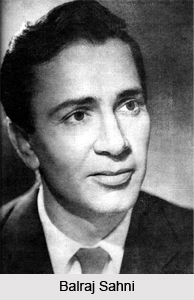 Balraj Sahni was a multi talented theatre personality. He was a director, actor, film star, poet and fictionist in different theatres. The names can be mentioned as Hindi, Urdu, Punjabi and English Theatre. Balraj Sahni, the Punjabi theatre artist was born in Rawalpindi, which is now in Pakistan in 1913. He inherited the moral values of the Arya Samaj from his parents. He studied literature at the Government College, Lahore, and began composing English poetry and acting in amateur theatricals. While teaching Hindi and English at Shantiniketan in Bengal and a later stay at Wardha in Maharashtra brought him in close contact with Tagore and Gandhi respectively. He worked as a journalist and then as an announcer for the BBC`s Hindi service in London, where he was influenced by Marxist philosophy. Consequently, his personality developed as a combination of a broad outlook with a keen desire to share the sorrows and hardships of the underprivileged in society.
Balraj Sahni was a multi talented theatre personality. He was a director, actor, film star, poet and fictionist in different theatres. The names can be mentioned as Hindi, Urdu, Punjabi and English Theatre. Balraj Sahni, the Punjabi theatre artist was born in Rawalpindi, which is now in Pakistan in 1913. He inherited the moral values of the Arya Samaj from his parents. He studied literature at the Government College, Lahore, and began composing English poetry and acting in amateur theatricals. While teaching Hindi and English at Shantiniketan in Bengal and a later stay at Wardha in Maharashtra brought him in close contact with Tagore and Gandhi respectively. He worked as a journalist and then as an announcer for the BBC`s Hindi service in London, where he was influenced by Marxist philosophy. Consequently, his personality developed as a combination of a broad outlook with a keen desire to share the sorrows and hardships of the underprivileged in society.
In 1944, Balraj Sahni, the Punjabi theatre personality joined the Indian People`s Theatre Association (IPTA) in Bombay, directing and acting the lead in its popular production of Khwaja Ahmad Abbas`s Zubeida. He also worked on Jadu ki kursi i.e. `Magic Chair`. This was directed by Mohan Segal and written by him and Rama Rao. Kapur Singh Ghuman`s Udhali hoi kudi or `Abducted Girl` was directed by Baij Sharma in Punjabi, Tagore`s Kabuliwala i.e. `Man from Kabul` was directed by Sharma, Gobind Malhi`s Musafiron ke liye i.e. `For Travellers` was directed by Ritwik Ghatak. Abbas`s Lalgulab ki wapasi i.e. `Return of the Red Rose`, Kartar Singh Duggal`s Upareli manzil i.e. `Upper Storey`, and Kaifi Azmi`s Akhri shama i.e. `Last Light` in Urdu was based on Mirza Ghalib`s life. Under the banner of Juhu Art Theatre, his own group during the 1950s and 1960s, he took the main roles in Gogol`s Inspector General and Azar ka khwab i.e. `Azar`s Dream` was the Hindi adaptation of Shaw`s Pygmalion. Balraj Sahni regularly designed sets too. Neo-realistic style and naturalistic acting made his writings, productions, and performances convincing, drawing spectators in large numbers.
Balraj Sahni`s cinema career tended to overshadow his stage achievements. He co-scripted Guru Dutt`s Bazi i.e. `A Game of Chance` in 1951 and directed Lal batti i.e. `Red Light` in 1957. This was a tense movie set in a railway station as India gains her independence. Balraj Sahni played important roles in many films, beginning with IPTA`s Dharti ke lal i.e. `Children of the Earth` in 1946. Other major screen credits include Hamlog i.e. `Ourselves` in 1951, the rickshaw-puller in Do bigha zamin or `Two Acres of Land` in 1953, the postman in Garam coat i.e. `Overcoat` in 1955, Taksal i.e. `The Mint` in 1956, Kathputli or `Puppets` in 1957 were worth mentionable. Some others can be named as Lajwanti in 1958, the poet in Sone ki chidiya i.e. `Golden Chick` in 1958, Chhoti bahen i.e. `Younger Sister` in 1959, Satta bazar i.e. `Speculation Bazaar` in 1959, Anuradha in 1960, the eponymous Kabuliwala in 1961, the platoon leader in Haqiqat or `Reality` in 1964, Waqt i.e. `Time` in 1965, Shayar-e-Kashmir Mahjoor i.e. `Mahjoor, Poet of Kashmir` in 1972, and the father in Garam hawa i.e. `Hot Winds` in 1973. Balraj Sahni`s autobiography i.e. Yadein or `Memories` in Hindi came out in 1972. Balraj Sahni died in 1973.




















